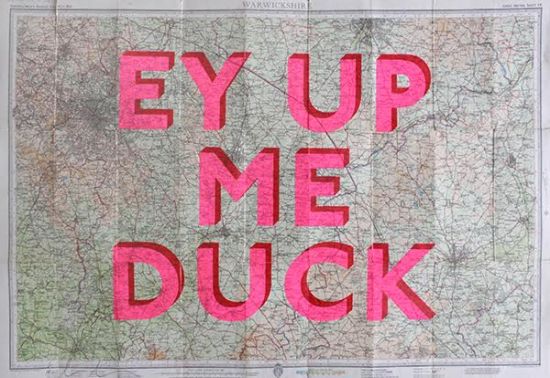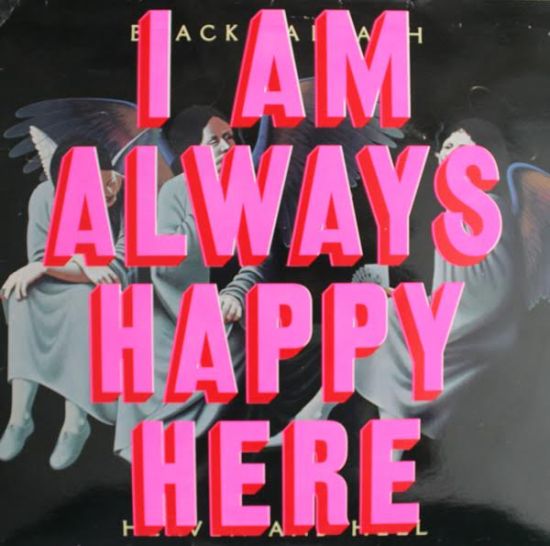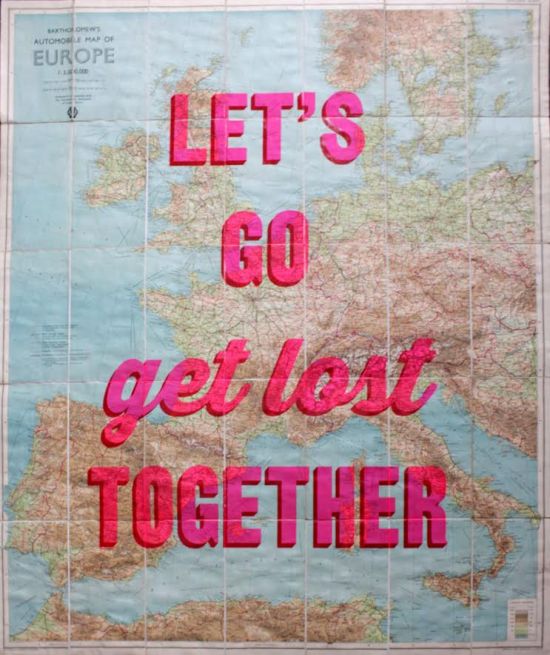
5 Minutes with… Dave Buonaguidi

‘Let’s Go Get Lost Together’. It’s the legend on a line of screen prints that Dave Buonaguidi has made using old maps – but it’s also a pretty apt motto given the last few years of his life. The serial entrepreneur, who set up St. Luke’s, the Channel 4 in-house agency and Karmarama was feeling restless. He had just turned 50 and there were loads of things that he still hadn’t done. And so he resigned. And the day after he went off to do a screen printing workshop. He’d always fancied having a go at being a professional artist, so why not? Over the past couple of years he’s built up a hefty following (a trip to Print Club London verified this - he’s one of their bestselling artists ‘because he has such good ideas’) and these days he has a healthy side line. He’s back in the agency world, as Crispin Porter + Bogusky London’s first CCO – their mentality and ambition were too in synch with his own to resist – but late at night or early in the morning, he can still be found pulling prints.
He’s palpably excited about his work and team at CP+B, having had a year to infuse the place with his ‘make stuff’ energy. He’s also been determined to fill the agency with real creative entrepreneurs, for example with CP+B’s Smart Fuckers Programme. But from a wider industry perspective, he’s still deeply frustrated with agencies’ intransigent refusal to do anything significant to address the lack of diversity that’s killing it. LBB’s Laura Swinton caught up with Dave in CP+B’s Kings Cross office.
LBB> So, this is really embarrassing but I really like your screen prints and I hadn’t quite clicked until recently that you ‘the print guy’ and you ‘the ad guy’ were one and the same! And then I discovered that you’d only been screen printing for a couple of years. How did that come about?
DB> I did it at college when I was 17, but I used to do a lot of painting too. Advertising, or the creative process of advertising, has always satisfied about 20 per cent of my creative yearning. The thing I love about advertising is making shit, making agencies, making groups of people. I know it’s going to sound a bit perverted but the thing that we make at the end of it is the thing that gets made as a result of making the first bit. So you build it and it happens. It’s about figuring out who the best people are, getting them in, building a great environment, happy days.
The problem with advertising is that it’s so slow. It takes for ever, it takes too many people, costs too much money. As a result it feels cumbersome. You come up with these ideas for other things but think ‘I don’t know how to make them’, so you end up with this mental filing cabinet of ‘stuff’.
When I left Karmarama, I had a year where I wasn’t allowed to work in advertising so I thought, ‘right, I’m going to learn a trade, a skill’. So the day after I left I did a one day course in screen printing at Print Club in Dalston. They do this cute thing where they take you to the gallery and the workspace after the workshop and I thought, ‘you know what, I do need desk space. £200 a month, I’ve only got to sell three prints and they’ll pay for themselves’.
I remember approaching it in a very commercial way. I asked the gallery owner Kate what sells. She said, ‘In all the years I’ve done this, no one has ever asked me that.’ Normally artists say, ‘I do pictures of … dogs. Or landscapes.’ And then it’s up to the gallery owner to figure out how to sell it. I think she said parrots and pineapples! I said, ‘Really?’ And yes, these were the two biggest selling things. I just thought, well, I come from advertising and we use culture to strategically influence what we do.

LBB> And now you’re back in the agency world, you’re still hard at it with the printing?
DB> I love it. For me it’s a complete release. I think one of the dreams I had was, ‘could I ever become a professional artist?’ Advertising is a young man’s game and I’m not young any more. I set myself a target of a year to do it and it didn’t happen in a year, but it’s getting busier and busier now. I do loads of stuff, but I do it at night.
LBB> Really?
DB> I don’t smoke, I don’t drink, I don’t do drugs and never have done – I’ve always just found a huge amount of satisfaction in making shit. And so in a way, that’s my drug of choice. You get a double hit. You get to make something and you get to sell it to somebody. In a way there’s a third bit in that, when it’s done it’s done. In advertising we get overwhelmed by what we’ve done in the past. That’s our trophy cabinet. It doesn’t matter. There’s something really liberating about having an idea, printing 50 of them, selling 25 and working out what to do with the other 25. Just get rid of them. They’re either not going to sell or are going to go really slowly – just get rid.
LBB> It’s that weird paradox of creativity – that you’re compelled to make stuff because you want to get an idea out your head and when you’re done you’ve got shit everywhere.
DB> I actually find it stimulates how I work in advertising now. I remember when I set up 4Creative, there you had no money, no time and a huge amount of stuff to do. Our entire budget for the year was the same as the last ad I’d done at St Luke’s - £450,000. That was in the old days of Channel 4. You had a lot of people who just knew how to make stuff very quickly. They’d do it all themselves and stick it on air.
They’d call it ‘dropping things into a river of creativity’; it’s just another droplet in a river. I love that concept and I try to do that with my art. Why have six ideas a year? If you’re creative you have thousands – try and figure out what you can do with them. If you can make some of them, make some money and make some other people happy potentially, then that’s got to be a good thing.

LBB> Now that you’ve really established your screen printing, do you find the younger creatives round the agency talk to you about their own projects because of it?
DB> Yeah and we hire people specifically because of it. One of the banners hanging up here is ‘Thinkers, Makers, Doers’ – that’s what we want. Lots of creative people say they ‘do’, but they ‘don’t’. We’ve got a workshop down in the basement where our tech guys are building platforms and things… but we’ve also got a guy making a soap. He takes moulds of certain parts of his girlfriend’s body… it’s called boob soap basically and it’s to try to encourage women, when they’re showering, to check their breasts for cancer. I love that. It feels like… he could have come up with the idea and gone to a model maker, who would have charged so much money and instead he’s doing it himself.
Another thing that we do is that everyone has to do the one day course when they start. We’ve got our tote bags and pads and we print all those ourselves. We could get someone else to do it but there’s no fun in that.
LBB> A lot of the projects you’re involved with at the agency are digital, involve new technologies – do you find it stimulating to do something that’s hand made?
DB> There’s something quite nice about it going through the body. Sometimes you sound really old fashioned when you talk about that sort of stuff. I do all my work on the computer, so the screen printing image is all created on the computer but there’s a lovely shift that happens when you make something and it has to go through the analogue process where you mess it up. There’s a lot that can be learned in the work that you do with clients.
LBB> Having had that year to pursue your art before coming back into the industry, do you feel that the experience has given you a new perspective?
DB> It was weird. I had an idea about setting up another agency. Every time I’ve set up a business it’s always been to try and improve on the one I’ve had before. It’s easy to sit there in our career at a certain point and think ‘this is it, I’m going to do this for the rest of my life’.
The moment for me at Karmarama was when I hit 50 and thought, ‘bloody hell, I’ve got fewer years ahead of me than I’ve got behind me’. I didn’t like it any more. Normally when you set up your own business, it’s the answer to all your frustrations… but sometimes it makes you more frustrated. Setting up a business is very different to maintaining a business. Setting up a business is about changing the world, making things happen… when you’re maintaining you find yourself working with people who would never have worked on a weekend, would never have gone out to get toilet paper or answered the phone. It’s a different mentality.
The thing I loved about trying to forge a new career as an artist was the learning. Learning is so important and a lot of people think, when they get to a certain stage in their career, ‘I don’t have to learn, I’ve got other people to do that for me.’ I’m just a scruffy fucker who likes getting his hands dirty. And I like being around other people who are the same. When you’re in a group and you’re learning something new together but you’re also doing something that is of value to other people, it’s a really important thing.
One of the things that I like about CP+B is that it feels like you’re part of an army. I know it sounds cheesy but when you’re in, you’re in. If you fall down you’ll get picked up and helped and mentored. It’s an amazing thing.

LBB> And what was it about Crispin Porter + Bogusky that appealed to you?
DB> I was pretty much done with advertising.. Nobody leaves their own business because they’re happy with it. I wanted to try and do something else, on a very small scale, with two or three other people. Two of them now work here, though they didn’t at the time. They were the only two people I’ve worked with in the business that I’ve trusted and they get the idea of creativity and business and culture. I thought, ‘why does life have to be more complicated than that?’
I had that year and I wasn’t allowed to talk to anyone or do any of that.
I knew Chuck; back in 2005 they had tried to buy Karmarama and I had kept in contact with him. He’s a really nice guy and I liked what the company had done in the States and I got excited when they launched here. Somebody contacted me and asked if I wanted to come in for a chat and I thought… ok… I sat down with Richard [Pinder, CP+B UK CEO] for about an hour and he asked what I was thinking of doing. And I said, ‘I don’t really know but I don’t want it to be advertising’. But I told him what I liked doing and it turned out to be the same thing that they wanted to do at CP+B. Richard said, ‘that’s what we want to do too, so why don’t you come and do it here?’
It’s going to sound cheesy… but you always meet someone interesting at a party you don’t want to go to. I came in and it was all done in an hour. The thing about CP+B is that they’re a culmination of all the agencies I’ve ever been taught by: Chiat Day, Howell Henry… they were all in that vibe. All the agencies I’ve worked at or set up have had that vibe, so it felt like coming home.
LBB> I think the agency is in a really interesting place. They’re known for all their work in America, but now we see so much interesting CP+B work coming in from all over the world, Scandinavia, Brazil…
DB> It’s really interesting because when I arrived – and no disrespect to people who used to work here – London hadn’t really caught fire.
I think the way they did it in Scandinavia was acquire an agency that was doing really well and that worked. In London they put together a group of people and tried to make it work. I’ve seen that before. Fallon took a while to get going. Wiedens took four or five attempts.
It’s a perfect storm that needs to come together; the chemistry of the people, what’s going on in the business at the time. Here there was the ambition – because obviously they’ve got a lot of ambition in Miami, Boulder and LA. Brazil is new and Scandinavia was new and London, as far as I was concerned, was a start-up. The big agency boys were all in the States and so it was all up for grabs.
I have this weird vision of Chuck sitting in his dressing gown, in a chalet somewhere, looking at a big map on a table covered in lights showing all the different offices. And he’s flicking the light over London, checking if it’s working. So my ambition, from a very selfish point of view, was to make it shine bright for Chuck. Make it fun. And if there’s something I do love it’s a start-up.
I talked to him a lot and he’s got that founder mentality. The agencies are changing, Miami and Boulder have gone through huge changes over the past five or six years, with Alex [Bogusky] leaving and [Andrew] Keller leaving, so they’ve gone through quite a big change of personnel.
LBB> So how did you find it coming in?
DB> There’s a very weird thing that I experienced – something I’ve never experienced before and it completely knocked me out. I headed over to the States and we had a meeting of all the creative heads of the agencies. Different cultures, different agendas, different egos – but everyone gets it. That’s the power of the CP+B brand. Everybody wants to do it for the right reasons and they’ve got a story that’s really compelling. It feels right. And it attracts a certain kind of person. If you get it, you get it and you’ll get on with it.
LBB> And talking about people who ‘get it’, where do you find them?
DB> We’re always looking for entrepreneurs who have no history in advertising. When you get young people who are just desperate to make stuff, to prove themselves, it’s really easy. When you get an entrepreneurial creative – and I don’t just mean an art director or a copywriter, I mean entrepreneurial, problem solving people – they bring a different kind of energy to it. It’s hard to describe. In advertising, people have their different areas of expertise and they can get territorial. Here, I don’t know what it is, the people are young, they love communicating and they’ll sit down and sort things out. There’s no ego or volatility.
LBB> In the past you’ve talked about the creative industry in the UK - and probably elsewhere too - is dominated by a certain kind of person, in a certain location, with a certain background. One of the ideas you had to combat that was to establish a creative school that would open the industry up. Where are you with that?
DB> That was something I was trying to do in that year off. Get famous as an artist and set up a creative school that was free. That’s the thing about advertising; it’s full of wankers who like to say ‘yeah, yeah we must be braver, more diversity is needed’. And everyone goes, ‘well done you’ and they get an OBE. It’s much harder than that because you’ve actually got to do something about it.
The free school thing, Gratis, I’m still trying to do but I don’t know if it will ever happen. I’d love the government to fund half of it and the industry to fund the other half of it… but the industry’s got no money and neither does the government. So you’re in a pickle.
The big problem with the industry is that it’s all white male middle class heterosexuals, traditionally from quite nice areas of the world, like London. I think they’ve systematically fucked it up over the past 30 or 40 years and have turned it into a party for themselves. And then you’ve got a problem with education. The only people who can afford to get in are the kids of fat, white, middle class, heterosexual men from London who work in advertising.
My thing is, if you’re a girl and you’re from the Isle of Skye, why would you even try to get into the creative industries, full stop? How would you even have heard of it? How would you have been groomed at school or college to up your roots and get into a business that’s full of white male bullies? There’s no reason you would want to do that.
And, equally, if you’re a Bangladeshi boy or girl in Brick Lane or Tower Hamlets, on the doorstep of the coolest creative community in the world (if you listen to Boris Johnson)… why the fuck would you want to do that either? That’s the thing that got me.
I was really lucky. I got into advertising because my Dad ran a restaurant that fed a bunch of people who worked in advertising. That was as easy as it got for me. I’m a fat white boy from London, heterosexual, whose dad had a restaurant. But if you don’t have that step, you don’t have 15 grand to pay for a course, move to London, who can afford that?
LBB> Maybe the problem is that the industry talks about the problems of diversity but only ever attempts to address the symptoms rather than the cause?
DB> The only way to address it is to make further education free, or at least some of it. If I run the Miami Ad School and somebody’s going to give me £16,000 for a one year course, I’ll take that. If I can fill it with 100 students, I’ll take that. It just means that only rich people can afford to.
There are two parts of it. One is, god forbid, you’re really talented but you can’t afford to get in. But of course that is the case. And the second part is, what if you’re meant to be creative in your life, in the short time that you’ve got on this spinning ball? What if that’s the one job that you’re supposed to do, that would be really valuable to the rest of the world… and you don’t have the opportunity because you’re the wrong religion, wrongly located, don’t have the money. That’s a shit way to do it, given that we live in a modern country
It frustrates me. I don’t know how you solve it but I would love to see creativity in the curriculum at school. When I was at school, they thought I was a dummy because I was borderline dyslexic and probably OCD, which I’ve just found out at the age of 52. If that was recognised and you could find people who are creative – when you’re a kid you’re way, way more creative and you get it all kicked out of you. What can you do about it? It’s about mentoring, it’s about creativity in school, about further education being more helpful for people who are creative. It’s about opening the door.
LBB> It starts to get really political when you dig into it…
DB> It is political and it’s not political. We wank off about how much money the creative industries generate. And when you look at the creative businesses, a huge amount of them are run by accountants, run by procurement, where creativity is just another little fucking column on an Excel spreadsheet. I always thought that creativity was a very valuable tool.
We have a banner here that says ‘creativity is the cure’ and I absolutely believe that it is the single most important asset to any business.
If creative problem solvers can transform your business, that’s pretty valuable. But in reality, it’s all about control, who owns the relationship with the client. The creative thing is just another entry on a spreadsheet that’s being driven down in value. How do you flip that?
LBB> At an agency level, are you doing anything to address it in your own hiring practices?
DB> We’re doing a project at the moment with a company called ‘Future Rising’. I was fed up of hiring people who wanted to get into advertising. I want to get people who haven’t even thought about advertising and the creative industries and see what they can do. You get a much more interesting work force. And if they’re more interesting, they’re going to create much more interesting products.
We do this thing with Future Rising called ‘The Smart Fuckers Programme’. We got them to find the top 5 per cent of creative entrepreneurs coming out of college in the country. If they can find 200, 300 people, we want to talk to them. And if five of them like what we do and decide they want to come into a creative agency, then we’ll hire them. If you keep going to Watford and the other advertising schools, you’ll just end up with the same product.
So we did that and we had about 35 people who came in, all from different areas of further education. There was an economist, a historian, a vet, some designers; a really odd bunch of people. We broke them up into groups and set them briefs and they had an hour to come up with solutions to the problem. We weren’t asking ‘do some ads’. We asked, ‘solve the problem’. And every single one of them came back with something amazing. We presented one to a client and that’s the one she really likes.
Advertising has to change and if people keep coming in trying to slow it down, repeating what our grandfathers did, then it’s irrelevant. But these guys were amazing. I’ve never experienced anything like it. With the Smart Fuckers Programme, by cutting off 95 per cent of the normal people who come in, you force yourself to be different.
LBB> So you’re forcing yourself to behave differently…
DB> Pull a thumb out of your arse and do it. A lot of people struggle with that because they’ve worked out that sound bites work rather well. If I just say I’m going to do it, sometimes that’s as good as doing it. People go ‘oh Dave, you did the free school’. No I didn’t, it didn’t fucking happen, don’t say that it did. Just because they’ve read somewhere that you were going to do something they think that you’ve done it. You can just say something nowadays and everyone believes you. No one checks. Doing it is considerably harder than saying it, but what a difference it would make.
LBB> So do you think the industry can change?
DB> It’s all about the people you bring in. I think if agencies continue to do what they’re doing, they will fall down the toilet. Every agency goes through a new management line up every six weeks, it feels more and more regular. Because they keep bringing in the same kind of people and expect something different.
I think it’s interesting when you look at companies like Accenture buying agencies. Accenture have always had a huge amount of respect because they charge a huge amount of money. No client would ever go back to them and go ‘you’re expensive, aren’t you?’ They’d reply, ‘yeah. We are.’ Whereas agencies go, ‘well how much do you want to pay? I tell you what, we’ll do it for 10 per cent less than you want to pay so you’ll like us more.’ You have these bullshit relationships. There’s no balance, clients have no respect for us, and rightly so, because in the '80s we took all their money and frittered it away.
The brilliant thing about consultancies is that they’ve embraced data. They’ve figure out that information is better than no information. It’s not rocket science. The minute you figure out you’ve done something that’s wrong, change it very quickly and do something that’s right. That’s what I loved about 4Creative, that they had the data. If an ad got an extra million people to watch the programme and after ten minutes 900,000 turned off, well I can tell it’s not my problem it’s that the show was shit. That’s what I want to know. You have to transform businesses using the tools at your disposal.
If a company like Accenture or Bame acquires a creative agency and thinks that’s all its problems solved, well, it’s not. They’ll have a whole bunch of people that are not fit for purpose because a lot of agencies are not fit for purpose. They think their business is winning awards, not helping clients.
LBB> So you’re not into the industry award circuit?
DB> Not at all. The founding principle of St Luke’s was ‘no creative awards’. The founding principle of Karmarama was ‘no creative awards’. The minute I left they were entering awards.
I don’t know if it’s just me, but when I was a client at Channel 4, I would walk into an agency and they’d say ‘this is going to be an award-winning ad’. And I’d go, ‘hang on, I want more viewers, I don’t want to win awards’. I suddenly saw myself presenting back to me and I didn’t like it.
It’s a false jury. Why should I find 12 people working in my business to judge what I do? I’m trying to do something that’s original and forward thinking and I have to go back to the old jury who have ‘earned their stripes’ and ask them for permission to win an award. It’s just become this thing where it’s an old boys club. It’s all about money and egos. These companies make huge amounts of money. You don’t get 12 awards for best picture at the Oscars.
And then you get agencies playing games and making fake ads just so they can win an award so the creative director can get a bonus. It’s so corrupt. I find it very liberating not to have anything to do with it. Don’t worry what anyone else in advertising thinks, they’re not my clients.
LBB> But despite all that, do you have hope for the industry?
DB> The best time to be alive is right now because it’s all fucked. If you’ve got any nous, you can run around and pick up the pieces. I’ve lived through… I don’t know how many recessions. Every time I was working in a new start up. Howell Henry started during a recession. Chiat Day. St Luke’s. Karmarama. And you go through all those and it’s the most exciting fun to be had, because it’s all there for the taking. When people sit back and think everything is booming, it’s so irrelevant and out of touch.
Now, I think, we’re more or less in a permanent state of recession. It’ll never boom. But it’s great – if you can get your head round it.
And it helps that the new generation just gets on with it because it’s all they’ve known. When you get these old honkers who sit around going, ‘it was so much better in 1984 when you could have nine hour lunches’, I think, ‘fuck man, it’s changed’.
LBB> One question I had – one of your prints that I really love is ‘Let’s go and Get Lost Together’. Where’s the weirdest place you’ve got lost?
DB> Physically or actually? Because the weirdest place I got lost was in this business. Two years before I left Karmarama I was so lost, I didn’t know what I was doing. I was so disillusioned with everything. I think I just needed a change. Physically, I’ve got lost in millions of places!
It was a real act of liberation when I talked to my missus and she said, why don’t you just leave. And I thought ‘I’d never thought about that’. Karmarama felt very mine, very personal. But when I left it was the easiest thing in the world to do.
Usually when you set up an agency and you’re 50 odd, you’re just sailing off into the sunset. I wanted to go back to college and learn something. Just staying alive. It sounds really wanky but I just like the idea of staying on it, learning. It’s much more interesting than sitting there thinking that you’ve learned it all and that you’re king of the mountain.













